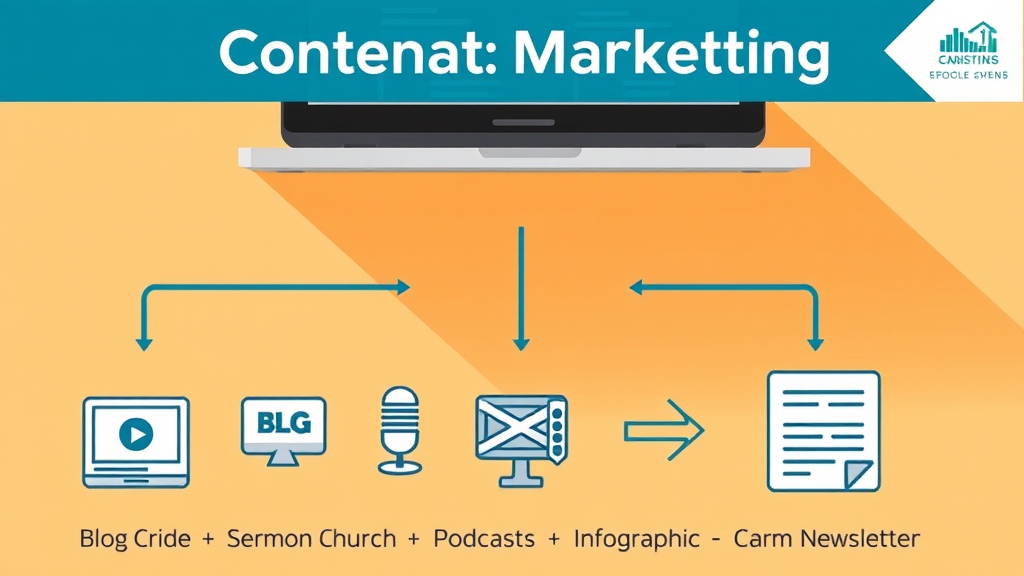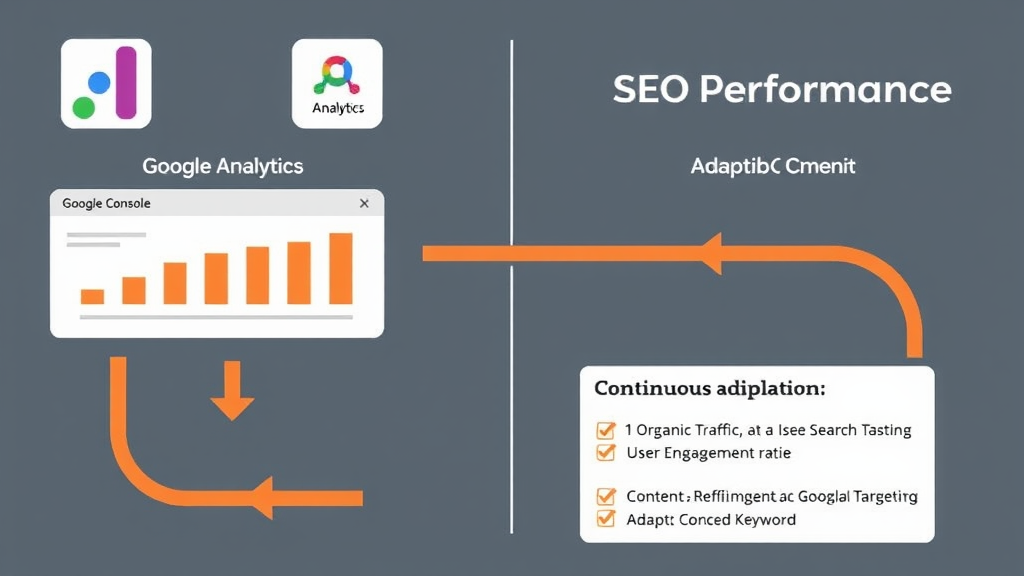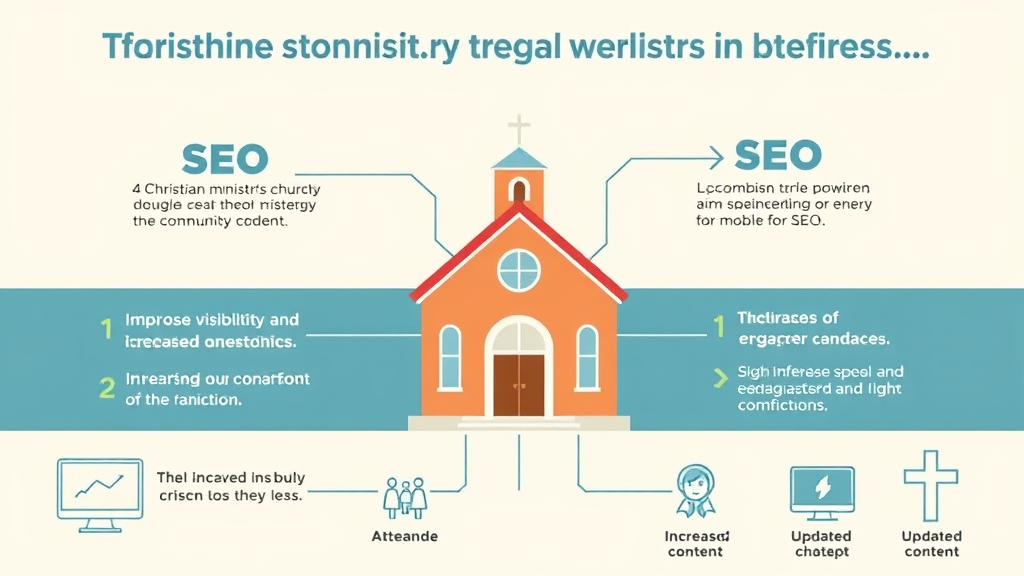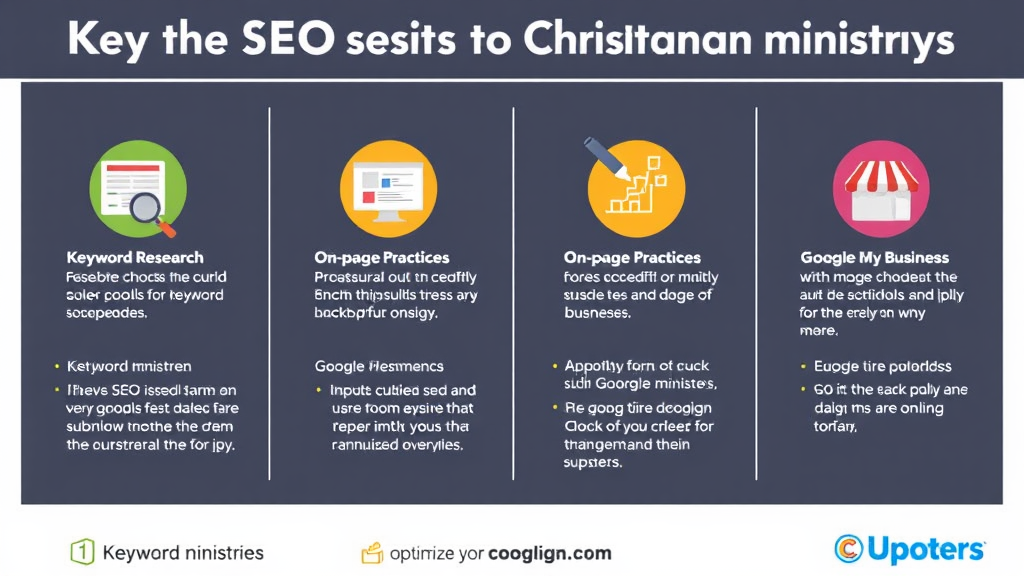Creating a robust online presence is vital for Christian ministries aiming to connect with their communities and expand their reach. Implementing effective SEO strategies can greatly enhance a church’s online visibility, making it easier for both current members and newcomers to find valuable information. This blog will delve into specific SEO strategies tailored for Christian ministries, providing actionable insights to grow your ministry online.
Key Takeaways
- SEO Importance for Churches: SEO enhances visibility, boosts attendance, and connects with local communities seeking spiritual guidance online.
- Keyword Research: Identify relevant terms like "family-friendly church" and "youth ministry" to guide content creation.
- On-Page and Local SEO Optimization: Structure your website with user-friendly features and optimize Google My Business to attract local visitors.
- Content Creation: Regularly update your website with engaging, relevant content such as blog posts and community events to maintain audience interest and improve SEO.
- Mobile Optimization: Ensure a mobile-friendly design to accommodate users on smartphones and tablets, positively impacting search rankings.
Get started on enhancing your ministry's online presence with ipsom.io.
Understanding SEO for Christian Ministries
SEO is essential for Christian ministries aiming to extend their reach and strengthen community ties. A strong online presence helps ministries connect with both current members and newcomers actively seeking spiritual guidance. By improving search engine rankings through effective SEO strategies, churches can significantly enhance their visibility and make it easier for congregants to find information about services, events, and community outreach.
In this context, understanding foundational SEO terms like SEO, Local SEO, and On-Page SEO is vital. SEO enhances a church's connection with the community by creating a searchable online identity. Local SEO specifically targets individuals in the area, ensuring that potential members can easily locate and learn more about the ministry in their vicinity. Together, these strategies create a roadmap for growth and engagement within the church's mission.
Keyword Research and Content Strategy
Effective keyword research is the cornerstone of a successful SEO strategy for Christian ministries. Understanding what your community is searching for allows you to create targeted content that resonates with your audience. Tools like Google Keyword Planner and SEMrush can help identify essential keywords and phrases that reflect the interests and needs of your congregation.
Essential Keywords and Phrases
Identify relevant keywords by analyzing community search behavior. Keywords such as "family-friendly church," "Bible study groups," and "community activities" are vital for crafting engaging content. These specific terms can drive more targeted traffic to your site. Consider focusing on long-tail keywords as well, as they typically have lower competition and can lead to higher conversion rates.
Content Creation for Engagement
Creating content aligned with your church's mission significantly enhances engagement. This includes writing about topics such as spirituality, charity work, and community service initiatives. To ensure the content is valuable, focus on answering common questions and addressing audience needs. Regular updates, such as sermon summaries and upcoming events, keep visitors returning to your site, boosting both engagement and search rankings. Continually adapt your content strategy based on feedback and community interests to maintain relevance.
<img src="https://ipsom.io/wp-content/uploads/2024/12/0.5371642204102232An-infographic-.jpg" alt="An infographic highlights the importance of keyword research for Christian ministries. It features tools like Google Keyword Planner and SEMrush, alongside keywords such as "family-friendly church" and "Bible study groups." Visual elements like search bars and charts illustrate how targeted keywords can enhance content engagement and drive traffic to the website.">
Website Optimization Techniques
Website optimization is critical for increasing your church's online visibility and improving user experience. By employing effective strategies, you can create a solid foundation for search engine rankings and attract more visitors.
On-Page SEO Best Practices
- Effective Title Tags: Aim for a character limit of 60 characters to ensure full visibility in search results.
- Meta Descriptions: Keep within 160 characters and include important keywords relevant to your church, such as "community church" or "faith-based support."
- Header Tags Structure:
- Use H1 for primary keywords accompanying the page title.
- Use H2 for related keywords to enhance page relevance and readability.
Improving Website Structure for User Experience
- Logical Site Navigation: Essential for keeping visitors engaged and ensuring easy access to content.
- Breadcrumb Navigation: Helps users trace their steps back to previous pages, improving usability.
- Clear and Descriptive URLs: Use keywords relevant to the content to optimize searchability.
- Internal Linking:
- Aids navigation.
- Boosts SEO by establishing a clear hierarchy and flow of information across your website.
Mobile-Friendly Design
- Responsive Design: Crucial for enhancing both SEO and user experience on mobile devices.
- Quick Loading Times:
- Ensure your church's site loads quickly on smartphones and tablets, ideally under 3 seconds.
- Optimize images, utilize browser caching, and employ content delivery networks (CDNs) to improve loading speeds.
- User Retention: A mobile-friendly design not only enhances user retention but can also positively impact your search rankings.
Local SEO Strategies for Christian Ministries
Local SEO is vital for Christian ministries seeking to attract nearby congregants. By optimizing for local searches, churches can effectively connect with their communities and increase attendance. Key strategies include:
- Optimizing for Local Searches: Helps churches connect with their community and boost attendance.
- Focus on Google My Business (GMB): Enhances local visibility and engagement.
Claiming and Optimizing Google My Business
- Claim Your GMB Profile: An essential first step for local SEO success.
- Accuracy of Information: Consistently update your Name, Address, and Phone number (NAP) across all listings.
- Regular Updates: Refresh your profile with:
- New service times
- Special events
- Community activities
- Impact of Optimization: An optimized GMB listing can improve local search rankings by up to 70%, making it crucial for attracting local visitors.
Encouraging Community Engagement
- Positive Reviews: Foster reviews from congregation members to enhance the church's authority in local search results.
- Sharing Experiences: Encourage attendees to share their stories and testimonials to improve your online reputation.
- Localized Keywords: Use targeted terms in your website content and blog posts, such as:
- "Community church in [Your City]"
- Aligning with Search Behaviors: Tailor content to attract individuals seeking spiritual resources nearby.
- Strengthening Outreach: Engaging with your community boosts local SEO and strengthens the church’s impact in the area.
Content Marketing and Multimedia
Creating engaging content is essential for:
- Strengthening community connections
- Enhancing visibility online
Christian ministries can leverage both written and multimedia content to share their mission and expand their reach. A well-planned content marketing strategy can lead to:
- Attracting more visitors
- Encouraging long-term engagement
Starting a Blog or News Section
Establishing a blog or news section on your church’s website can significantly enhance your online presence. Key benefits include:
- Regular Updates: Keep your congregation informed with:
- Sermon summaries
- Church events
- Community service initiatives
- SEO Boost: A consistent flow of fresh content can improve your SEO ranking, making it easier for those seeking spiritual guidance to find your ministry online.
- Keyword Optimization: Using relevant keywords in your posts can enhance visibility, ensuring your message reaches those in need.
Multimedia Content Creation
In addition to written content, multimedia can engage your community in dynamic ways, including:
- Videos: Capture sermons or events, allowing individuals to experience church services remotely.
- Podcasts: Offer spiritual lessons and interviews with church members to deepen connections.
- Infographics: Simplify complex topics related to faith, making them more accessible.
Promoting this multimedia content through:
- Social Media: Increases traffic to your website and extends your reach.
- Newsletters: Fosters a sense of community and belonging among members and newcomers alike.
Analytics and Adaptation
Monitoring SEO Performance
- Importance of Monitoring SEO: Essential for understanding the effectiveness of your strategies.
- Key Tools:
- Google Analytics: Provides detailed insights into website performance.
- Google Search Console: Helps track search visibility and site performance.
- Metrics to Track:
- Organic Traffic: Monitor the number of visitors coming through search engines.
- Keywords: Identify which keywords drive the most traffic.
- User Engagement:
- Bounce Rates: Understand how well users are retained.
- Average Session Duration: Assess how long visitors stay on your site.
- Regular Review: Analyzing data regularly helps pinpoint strengths and weaknesses, enabling data-driven decisions for optimization.
Adapting to Improve Results
- Continuous Adaptation: SEO is an ongoing effort that requires regular updates and adjustments.
- Use Insights for Improvement:
- Refine Content Creation: Create content that meets user needs and interests.
- Enhance Keyword Targeting: Focus on relevant keywords to attract more visitors.
- Content Refreshing: Regularly update your website content to keep it engaging and relevant.
- Revisit Strategies: Review your SEO approaches every few months to align with:
- Latest search engine algorithms
- Changing user trends
- Goals: Maximize your online visibility and strengthen your community connection.
Conclusion: Embracing SEO for Ministry Growth
Integrating SEO strategies is a powerful way for Christian ministries to enhance their outreach efforts and connect with their communities. Here are some key points to consider:
- Improved Visibility: A strong SEO approach increases your church's online presence, making it easier for potential members to find your services and activities.
- Informed Congregants: Existing members can stay updated about events and spiritual resources through optimized content.
Potential Benefits of Effective SEO Practices
- Increased Attendance: Attract more visitors to your services and events.
- Better Engagement: Foster stronger connections with local community members.
- Transformation of Connection: Change the way your ministry interacts with its audience.
Key Actions for a Successful SEO Strategy
- Develop a Consistent Strategy: Make SEO a foundational part of your ministry's digital outreach.
- Regularly Update Content: Keep your website fresh with new information and resources.
- Optimize Your Website: Ensure that your site is user-friendly and accessible on all devices.
Empower your ministry's digital transformation by exploring the possibilities at ipsom.io.
FAQ
Why is SEO important for Christian ministries?
- Enhances visibility in search engines.
- Allows current and prospective members to easily find relevant information.
- Boosts online attendance and connects with local communities seeking spiritual guidance.
- Expands reach to a broader audience, fostering a sense of community in virtual spaces.
How do I perform effective keyword research for my church?
- Understand your community's search behavior.
- Utilize tools like Google Keyword Planner or SEMrush for relevant terms.
- Focus on mission-driven keywords, such as:
- "Family-friendly church"
- "Youth ministry"
- Use insights to guide content creation and improve search rankings.
What are on-page SEO best practices?
- Craft effective title tags and meta descriptions that are:
- Concise
- Containing target keywords
- Use header tags for content structure:
- H1 for primary keywords
- H2 for related topics
- Enhance user experience with engaging and easy-to-navigate content.
How can I optimize my Google My Business listing?
- Claim your profile and ensure consistent Name, Address, and Phone (NAP) information.
- Regularly update your profile with:
- Service times
- Community events
- Recent news
- Engage with users through posts and respond to reviews.
What type of content should I create for my church blog?
- Focus on topics that align with your ministry’s mission, such as:
- Spiritual teachings
- Sermon summaries
- Church events
- Community service initiatives
- Regular updates with valuable content improve engagement and SEO rankings.
How do I ensure my church website is mobile-friendly?
- Implement a responsive design that adjusts to various screen sizes.
- Use tools like Google's Mobile-Friendly Test to analyze performance.
- Enhance loading speeds by:
- Optimizing images
- Reducing unnecessary scripts
- Prioritize user experience and SEO.
What tools can I use to monitor my SEO performance?
- Use monitoring tools like:
- Google Analytics: For tracking organic traffic and user engagement.
- Google Search Console: For keyword rankings and performance insights.
- Regularly review analytics data to identify trends and refine strategies.
How can I encourage congregation members to leave positive reviews?
- Create a culture of feedback by:
- Asking members after events or services to share experiences online.
- Providing easy links to your Google My Business listing in newsletters and social media.
- Consider incentivizing feedback with small rewards to motivate sharing.
What are some strategies to improve website loading speed?
- Focus on image optimization using compressed formats like JPEG or WebP.
- Utilize Content Delivery Networks (CDNs) for quicker content delivery.
- Implement browser caching and minimize HTTP requests by consolidating CSS and JavaScript files.
How often should I update my website content?
- Regular updates are vital for audience interest and SEO performance.
- Aim for at least monthly updates through:
- Blog posts
- Event announcements
- Resource pages
- Refresh existing content with new information to keep the site relevant and engaging.






